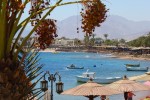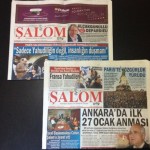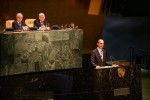The pope visited a Rome synagogue Sunday – the first visit to a synagogue during his papacy and a significant event in the context of inter-religious friendship. Pope Francis condemned violence based on religion and called on Catholics to rediscover the Jewish roots of Christianity. During the past half-century, relations between the Catholic Church and the Jewish community have made historical and immensely positive advances. Out of a history of bleak victimization based on Catholic teachings, the modernization of Catholic doctrine in the early 1960s reversed the millennia-old accusation of deicide and began a process of reconciliation that has been largely genuine and welcomed.
But, sadly, antisemitism – religious or otherwise – remains.
Recently released statistics say 2015 saw more Jews make aliyah from Western Europe than in any year since the founding of the state. Nearly 10,000 Western European Jews – 8,000 of them from France – made the move to Israel. While this level of aliyah will be heralded by some as a positive milestone, it reflects a dismal trend for Jewish communities in France, the United Kingdom, Italy and Belgium which, in that order, saw the greatest number of emigrants.
And the trajectory seems unlikely to abate, with Jews in the southern French city of Marseille now being advised by the leader of their community not to be seen in public with a kippah after a brutal assault on an identifiable Jew in that city and several years of similar violence across France.
In response, two women have started a social media campaign using the hashtag TousAvecUneKippah – everyone with a kippah. The idea is for everyone to don the traditional Jewish headwear as a gesture of solidarity and to confound those who would no longer be able to identify Jews to attack. This has resulted in some fun viral photos, such as a kippah on the Mona Lisa and another atop a model of the Eiffel Tower.
The idea that “we are all Jews” is an effort at solidarity and is a heart-warming and obviously well-intentioned move. It has some history, too. There is an apocryphal (that is to say, in this case, pleasant but untrue) story of the Danish King Christian X wearing a yellow star in solidarity with his country’s Jewish population during the Nazi occupation of his country. It is the sort of story that we wish were true.
Even so, there is a potential downside to claiming membership in an oppressed or victimized group. Middle-class North American university students wrap themselves in Palestinian keffiyas, thinking they are showing solidarity when to some it can have a whiff of blackface, of usurping the history of another.
Cultural appropriation can cut both ways. The idea that “we are all Jews,” as the kippahs-for-all idea seems to advance, has a potential to damage as well as heal. The pretense that “we are all Jews” could provide a licence to critique Judaism and Jews in ways that people would never dare with other ethnic or religious groups. If we are all Jews, after all, then antisemitism is little more than self-criticism.
Another not insignificant consideration is the fact that the world is not all Jews. Neither are we all Muslims (or Parisians or Charlie Hebdo or anything else). While such efforts at solidarity and support are well-intended, they also, in their way, betray a proud tenet of Canadian and other pluralist societies, which is that we do not gloss over or erase these differences, but celebrate and defend them.
Similarly, the pope’s efforts to exalt the Jewish roots of Christianity, seemingly well-intentioned, could be problematic. The fact that Christianity emerged as a Jewish sect has been a point of contention for 2,000 years. That a small group of stiff-necked people has refused to accept Christianity as a successor religion has caused outrage that has led to literally countless deaths over centuries.
The idea that we are all Jews is a nice one in times like these, but we should remember that such ideas have a double edge.




